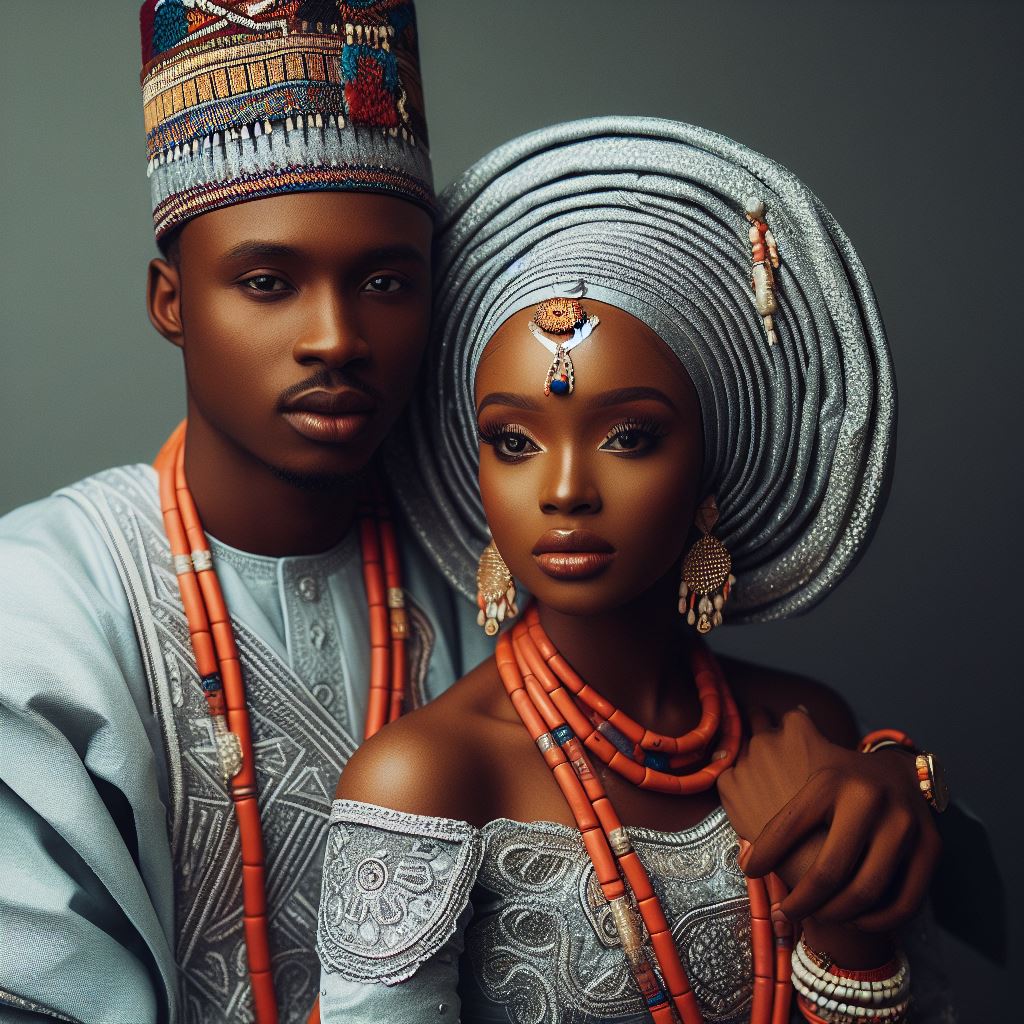Introduction
Let’s explore the role of extended family in Nigerian marital life.
A. Brief overview of Nigerian marital life
Nigeria, a diverse country in West Africa, has a rich cultural heritage intertwined with traditional practices, especially in marital life.
B. Importance of extended family in Nigerian culture
Marriages in Nigeria involve more than just the couple, as extended family members play a crucial role in shaping and supporting the union.
In Nigerian society, the extended family is highly revered and seen as an essential support system.
It consists of relatives beyond the nuclear family, including grandparents, uncles, aunts, and cousins.
These relationships are cherished and respected, creating a tight-knit community that influences various aspects of Nigerian life, including marital relationships.
The extended family’s involvement begins from the early stages of courtship, with influential relatives providing guidance and advice.
They often arrange meetings between the couple’s families, ensuring compatibility and shared values.
Once the union is established, the extended family continues to play an active role in the couple’s life.
C. Thesis statement: The role of extended family significantly influences Nigerian marital life
The extended family contributes to the success of Nigerian marriages by offering emotional, financial, and practical support.
They provide a safety net during challenging times, such as financial hardships, marital conflicts, or the upbringing of children.
The shared responsibilities and collective decision-making within the extended family structure strengthen the bonds between spouses and ensure the longevity of their union.
Moreover, the extended family also serves as a source of wisdom and experience.
Elders provide marital advice, impart traditional values, and serve as mediators in conflicts.
Their presence creates a sense of security and stability, creating an environment conducive to a healthy and fulfilling marital life.
Strengthen Your Marriage Today
Get personalized solutions for your relationship challenges. Receive expert Marriage Consulting tailored just for you in 1-3 days.
Get StartedIn short, the role of the extended family significantly influences Nigerian marital life.
The involvement of extended family members shapes courtship, supports the couple throughout their marriage, and provides a foundation for a strong and harmonious relationship.
The influence of extended family dynamics in Nigerian culture highlights the importance of community and collective responsibility in ensuring successful unions.
The Concept of Extended Family in Nigerian Culture
A. Definition of Extended Family in Nigerian Context
The extended family in Nigerian culture refers to a network that extends beyond the nuclear family.
It includes relatives such as grandparents, aunts, uncles, cousins, and even close family friends.
This extended family is an integral part of Nigerian society and plays a significant role in marital life.
B. Support System Provided by Extended Family
- One of the main roles of the extended family is to provide support and assistance to married couples.
- They offer emotional, financial, and practical support to ensure the success and stability of the marriage.
- In times of need or crisis, the extended family steps in to help and offer guidance.
- They may provide financial aid, childcare, or even temporary accommodation if required.
- The extended family also acts as a safety net, ensuring that no couple feels isolated or alone.
C. Cultural Values Associated with Extended Family
- Nigerian culture places great importance on communal living and interdependence.
- The extended family embodies these cultural values by promoting harmony, unity, and cooperation.
- Respecting one’s elders and valuing the wisdom and experience they bring are deeply ingrained cultural values.
- The extended family ensures that these values are passed down through generations.
- It also helps to preserve cultural traditions, customs, and rituals that are essential to Nigerian identity.
- The extended family serves as a repository of knowledge, traditions, and ancestral history.
In fact, the concept of extended family is deeply rooted in Nigerian culture.
It goes beyond the nuclear family and includes a wide network of relatives and close family friends.
The extended family plays a crucial role in providing support, guidance, and assistance to married couples.
They embody cultural values of communal living, interdependence, and respect for elders.
The extended family acts as a safety net, ensuring that couples never feel alone or isolated.
They also help preserve Nigerian traditions, customs, and ancestral history.
Overall, the extended family is an integral part of Nigerian marital life, offering a strong support system and promoting cultural values.
Pre-Marriage Involvement of the Extended Family
The role of the extended family in Nigerian marital life is highly significant.
Words No One Else Can Say, Crafted Just for You
Envision your deepest feelings woven into vows, speeches, or letters uniquely resonating with your love story. We craft personalized expressions no one else can replicate, capturing your emotions in words that touch hearts.
Express YourselfIn Nigeria, marriage is not just a union between two individuals but also a coming together of their families.
The extended family plays a crucial role in various aspects of pre-marriage arrangements, reflecting the cultural values and traditions deeply engraved within the society.
A. Traditional practices and rituals
Traditional marriage ceremonies hold immense importance in Nigerian culture.
These ceremonies not only signify the union of the couple but also serve as a way to honor and preserve cultural traditions.
The extended family actively participates in these ceremonies, showing their support and commitment to the couple.
Moreover, the involvement of the extended family in the selection of spouses is a common practice in Nigeria.
The family elders, particularly parents and close relatives, play a major role in choosing suitable partners for their children.
This involvement ensures that the union is not solely based on individual preferences but also takes into account the compatibility and background of the families.
B. Negotiations and financial contributions by extended family
Another significant aspect of the extended family’s role in Nigerian marital life is their involvement in negotiations and financial contributions.
One such practice is the bride price, which is a payment made by the groom or his family to the bride’s family.
This custom symbolizes respect and appreciation for the bride’s family and serves as a way to validate the union.
Furthermore, the extended family also contributes towards the expenses of the wedding ceremony.
This includes financial support for various arrangements, such as venue booking, catering, and decorations.
This collective effort eases the financial burden on the immediate families involved and reinforces the bond between the extended family members.
Transform Conflicts Together
Imagine turning disagreements into growth opportunities. Our unique worksheets guide you and your partner through challenges, building a stronger bond like no one else can.
Embrace HarmonyThe active participation of the extended family in these pre-marriage rituals and arrangements strengthens the social fabric of Nigerian society.
It showcases the importance of family values, unity, and support, which are deeply rooted in the cultural heritage of the country.
Overall, the role of the extended family in Nigerian marital life is multi-faceted.
From active involvement in traditional practices and rituals to negotiations and financial contributions, the extended family plays a vital role in shaping and strengthening marriages in Nigeria.
Their presence and participation create a strong foundation for marital life, emphasizing the significance of family bonds and cultural traditions.
Read: Building Strong Marriages: Tips from Nigerian Couples
The Role of Extended Family in Marital Conflict Resolution
In Nigerian marital life, the extended family plays a crucial role in resolving conflicts that may arise between spouses.
The involvement of the extended family in conflict resolution provides support, guidance, and expertise that contribute to the restoration of harmony within the marital unit.
A. Mediation and Counseling
1. Involvement of elders and respected members of the extended family
The extended family forms an integral part of the Nigerian culture.
Their wisdom, experience, and position in the family hierarchy make them key players in resolving conflicts.
In times of marital disputes, elders and respected family members are called upon to mediate and counsel the couple.
Their presence brings a sense of authority and respect to the situation, creating an environment conducive to reconciliation.
2. Utilization of cultural and traditional methods for conflict resolution
Nigeria is rich in cultural and traditional practices that have been passed down through generations.
These practices often include specific rituals, ceremonies, and customary norms that are believed to possess the power to restore harmony.
The extended family employs these methods, incorporating ancestral wisdom and traditional beliefs, to address the root causes of conflicts and guide the couple towards resolution.
These time-honored practices foster a sense of belonging and cultural identity while offering effective solutions to marital conflicts.
B. Arbitration and Decision-Making
1. Importance of extended family input in resolving disputes
The extended family is not only present to mediate conflicts but also to provide valuable input in the decision-making process.
Their role goes beyond simply acting as advisors; they actively participate in finding a resolution that is agreeable to all parties involved.
By considering the interests and concerns of both spouses, the extended family contributes to a fair and balanced outcome.
Their involvement ensures that the decisions made are not influenced by personal biases but take the well-being of the entire family into account.
2. Collective decision-making process within the extended family
In Nigerian society, decisions are often made collectively rather than individually.
This principle is extended to marital conflict resolution as well.
The extended family members come together to deliberate on the issues at hand, discuss the different viewpoints, and reach a consensus.
This collective decision-making process promotes unity, cooperation, and shared responsibility within the family.
It also strengthens the bond between the spouses and their extended family, fostering a sense of belonging and support.
In essence, the extended family plays a fundamental role in resolving conflicts within Nigerian marriages.
Through mediation, counseling, and the utilization of cultural practices, the extended family provides guidance and wisdom necessary for resolving disputes.
Additionally, their input in decision-making ensures fairness and inclusivity.
The involvement of the extended family not only restores harmony within the marital unit but also strengthens the bond between the couple and their larger family network.
Read: Navigating Marital Roles and Responsibilities in Nigeria

Post-Marriage Support and Influence of The Extended Family
In Nigerian marital life, the extended family plays a crucial role in providing support and exerting influence on the couple.
This section examines two key aspects of post-marriage support offered by the extended family: financial assistance and resource sharing, and involvement in child-rearing and childcare responsibilities.
A. Financial assistance and resource sharing
1. Provision of financial support during difficult times
Financial stability is an essential element for a thriving marriage.
Nigerian couples often face financial challenges due to various factors, including economic fluctuations or unforeseen events.
During difficult times, the extended family steps in to offer support.
They provide financial assistance to help the couple navigate through these challenging periods.
This assistance can be in the form of loans, gifts, or even temporary shelter.
The extended family recognizes the importance of stability and aims to alleviate financial burdens faced by the couple.
2. Sharing of resources among extended family members
Moreover, the extended family promotes resource sharing among its members.
This practice fosters a sense of communal living and ensures that resources are utilized optimally.
For instance, if one family member has excess food, they may share it with another family member who is in need.
Similarly, if one family member has surplus funds, they may invest or lend it to another family member for business purposes.
The extended family acts as a safety net, ensuring that resources are distributed equitably among its members.
B. Child-rearing and childcare responsibilities
1. Involvement of grandparents and other extended family members in raising children
Apart from financial support, the extended family also plays an active role in child-rearing and childcare responsibilities.
Grandparents, in particular, play a significant role in the upbringing of children.
They contribute their wealth of experience and wisdom to nurture and guide the younger generation.
Grandparents often spend quality time with their grandchildren, passing on cultural values and teachings.
Through storytelling, traditional practices, and moral lessons, the extended family ensures the preservation of cultural heritage across generations.
In addition to grandparents, other extended family members also participate in raising children.
Uncles, aunts, and older siblings often play supportive roles in shaping the upbringing of children.
This collective effort in child-rearing not only eases the burden on the couple but also provides a diverse range of perspectives and influences on the child’s development.
The extended family acts as a source of strength, guidance, and love in the journey of parenting.
2. Cultural values and teachings imparted by the extended family
Furthermore, the extended family serves as a reservoir of knowledge and traditions.
Cultural values, customs, and teachings are imparted to the younger generation by the extended family.
Children learn about their heritage, language, and traditions through active engagement with their extended family members.
This transmission of cultural knowledge strengthens the bonds between generations and helps preserve the unique Nigerian identity within the family.
In general, the extended family in Nigerian marital life plays an integral role in providing post-marriage support and exerting influence on the couple.
Financial assistance and resource sharing help navigate through tough times, while the involvement of extended family members in child-rearing instills cultural values and teachings.
The extended family serves as an important support system and ensures the overall well-being and continuity of Nigerian marital life.
Read: Marriage in Nigeria: Balancing Modern Views with Tradition
Challenges and Limitations of the Extended Family in Nigerian Marital Life
The extended family plays a significant role in Nigerian marital life, providing support, guidance, and a sense of belonging.
However, it is not without its challenges and limitations.
This section explores some of the difficulties that arise from the involvement of the extended family in marital affairs.
A. Intrusion and interference in marital affairs
1. Excessive involvement leading to conflicts
One of the challenges faced by Nigerian couples is the excessive involvement of the extended family in their marital affairs.
While the intentions may be good, this interference can lead to conflicts between the spouses.
The extended family’s opinions and expectations may clash with the couple’s own desires and choices, causing tension and strain in the relationship.
2. Impact on the autonomy of the spouses
Another limitation of the extended family’s role is its impact on the autonomy of the spouses.
The constant presence and influence of extended family members can restrict the independence and decision-making abilities of the couple.
This can create a power dynamic where the couple feels obligated to conform to the wishes and expectations of their extended family, even if it goes against their own desires and goals.
B. Conservatism and resistance to change
1. Traditional beliefs and practices hindering individual freedom
The extended family’s conservatism and adherence to traditional beliefs and practices can pose challenges to individual freedom within a marital relationship.
Nigerian culture places importance on maintaining family unity and upholding societal norms.
This can result in restrictions on personal choices, such as career decisions, educational pursuits, and even spousal selection.
The pressure to conform to these traditional expectations can limit individuals’ true potential and lead to dissatisfaction within the marriage.
2. Conflicts arising from differing expectations between spouses and extended family
Differing expectations between spouses and their extended family members can create conflicts within the marital relationship.
While the couple may have their own goals and aspirations, the extended family may have a different vision for their future.
These conflicting expectations can lead to disagreements and strain the relationship between the spouses and their extended family.
Finding a balance between honoring cultural traditions and identifying individual needs is crucial in navigating these conflicts.
In review, while the extended family plays a vital role in Nigerian marital life, it also presents challenges and limitations.
The intrusion and interference of the extended family in marital affairs can lead to conflicts and hinder the autonomy of the spouses.
Additionally, conservatism and resistance to change can limit individual freedom and cause conflicts due to differing expectations.
Understanding and addressing these challenges are essential for Nigerian couples to establish a healthy and harmonious marital life.
Read: Understanding Nigerian Marriage Traditions and Rites
Conclusion
The role of extended family in Nigerian marital life is significant and influential.
Throughout this section, we have emphasized the importance of extended family support.
It is crucial to maintain a balance between individual autonomy and involving extended family members in Nigerian marital life.




